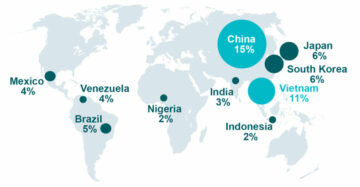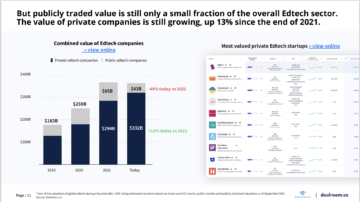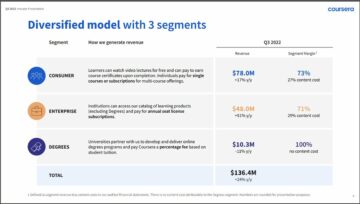
My partner Curtiss Barnes and I have been thinking a lot about punctuated equilibrium and how it might apply to post-pandemic education. We’re going to be both writing about it and having occasional Blursday Socials about it (starting this Blursday, 4/1). This post tees up both series.
The basic idea
Punctuated equilibrium is an idea that appears in both evolutionary biology and social theory. Stephen Jay Gould wrote a whole book about it. Regardless of the domain, the idea as an answer to the question of why something—a species, an ecosystem, a virus, a political system…whatever—can seem incredibly resistant to change for a long, long time and then suddenly change very dramatically. The details between the biology and political science versions are different enough that it’s not worth diving into them here. Instead, I find it easier to think about punctuated equilibrium in terms of feedback loops, which is an important concept in Systems Thinking. (By the way, if you’re going to read just one book on the subject of Systems Thinking and feedback loops, I highly recommend Thinking in Systems: A Primer by Donella Edwards.)
Basically, there are two kinds of feedback loops: balancing and reinforcing. You encounter both kinds all the time. A common example of a balancing feedback loop is the one created by your thermostat. If your house gets colder than a certain threshold, then the heat kicks on, raising the temperature back up above that threshold. When it hits that point, the heat turns off. If you also have central air conditioning, it works the same way when the house gets too hot. The balancing feedback loop created through your thermostat keeps the temperature inside your house very stable, even though the temperature outside may fluctuate as much as seventy degrees or more over the course of the year.
Reinforcing feedback is the opposite. A good example of reinforcing feedback is…well…feedback. You put your microphone next to your amplifier. The microphone picks up the sound from the amplifier and sends it back into the amplifier which—surprise!—amplifies the already amplified sound. This goes back into the microphone, and so on. In an instant, a sound turns into a deafening screech.
Many systems have multiple balancing and reinforcing loops that interact in complex ways. Climate is a good example. Most folks know that plants breathe in CO2 and breathe out oxygen. That’s why tree-planting is a popular climate change mitigation strategy. When the earth warms, more plants grow faster and longer in more parts of the earth. So plant growth can act as a balancing feedback loop for global warming. It’s like the thermostat turning on the planet’s air conditioner when it gets too hot. Unfortunately, plant growth also increases microbial activity in the soil, which…produces carbon dioxide (and methane, which is a potent greenhouse gas). On balance, plants generally remove more greenhouse gases than their activity creates. But “generally” does not mean “always.” And even in the general case, the reinforcing feedback greenhouse gas loop of the microbes partly offsets the plant growth’s balancing feedback loop.
There are many, many feedback loops in our climate system. For example, when the climate is regulated to stay within a certain temperature range, part of the earth’s soil is covered by permafrost. This traps all the greenhouse gas emissions that would otherwise have been produced and released by microbial activity. In fact, the earth’s permafrost carbon sink is estimated to hold roughly twice the amount of CO2 that is currently in the earth’s atmosphere. And now the permafrost is melting. As it melts, it releases more greenhouse gases, which warms the climate, which causes more melting of the permafrost.
Yikes.
This is why climate scientists (and I) are currently freaked out. It’s not just that we keep putting more greenhouse gases into the atmosphere. It’s that we are reaching certain thresholds that trigger reinforcing feedback loops that will swamp the balancing feedback loops. There could be a sudden, dramatic change that happens very quickly and brings us to a very different place, where the reinforcing loops finally exhaust themselves and new balancing loops kick in. We could find ourselves in a reverse Ice Age. For thousands of years. Because the whole point of punctuated equilibrium is that, once the balancing loops kick in and outweigh the reinforcing loops, the system becomes very, very stable. It takes a real shock to the system to move it again.
Punctuated equilibrium in education (and Blursday)
People have predicted unbundling, disruption, implosion, and various miscellaneous apocalypses in higher education for decades. But the system has powerful balancing feedback loops rooted in the economy, culture, and politics. Has that changed? If so, how? In what direction will which parts of education move? How far will they move? What indicators should we be looking at?
These are natural questions for us to explore here on e-Literate. They may seem a little heavy for Blursday Socials. But then again, if you can imagine yourself at a bar with your colleagues at a conference a few months from now, when it’s safe to hang out together physically again, what would you talk about? Probably about what’s changing and what might change next.
So this Blursday, and on occasional future Blursdays, we’re going to have a virtual bar conversation about that. And we’ll be having those conversations periodically, starting with different clues from different areas of the sector but then rambling wherever our bar conversation takes us. This time, Curtiss and I will both be thinking about For clues in this week’s conversation, we’ll be looking at Coursera’s recent S-1 filing for IPO and to the recent HolonIQ report, “Makers, Marketplaces and MOOCs. The Anatomy of Online Course Platforms.” The whole MOOC/OPM nexus is one area where we may see signs of change. Feel free to read these in advance. Or not. It’s Blursday Social, so whatevs.
Come shoot the breeze with us this Blursday, 4/1, at 4 PM.
RSVP.
(BYOB.)
Source: http://feedproxy.google.com/~r/mfeldstein/feed/~3/BY5L_9xwB0Y/
- Air Conditioning
- Amazon
- anatomy
- AREA
- biology
- carbon
- carbon dioxide
- change
- Climate change
- co2
- Common
- Conference
- Conversation
- conversations
- Culture
- dc
- Disruption
- economy
- ecosystem
- Education
- Emissions
- Finally
- Free
- future
- GAS
- General
- Global
- global warming
- good
- greenhouse gas
- Greenhouse gas emissions
- Grow
- Growth
- harvard
- here
- Higher education
- hold
- House
- How
- HTTPS
- ICE
- idea
- IT
- Long
- methane
- months
- move
- online
- online course
- Oxygen
- partner
- plants
- Platforms
- politics
- Popular
- post-pandemic
- Produced
- range
- Releases
- report
- reverse
- safe
- Science
- scientists
- Series
- Signs
- So
- Social
- stay
- Strategy
- system
- Systems
- thermostat
- Thinking
- time
- us
- Virtual
- virus
- within
- works
- worth
- writing
- year
- years







